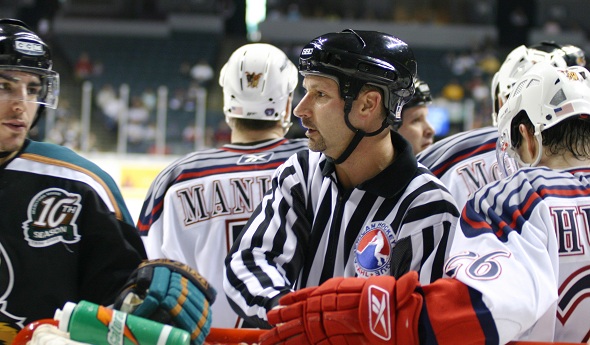
Garofalo: On-Ice Teacher and Recruiter
By
Rob Kaminski
MHSAA benchmarks editor
December 28, 2012
Something caught his eye as Allen Park’s Jim Garofalo circled the Olympic hockey rink in Salt Lake City to familiarize himself with the surroundings prior to the start of play at the 2002 Games.
“When the dimensions of a rink are laid out, everything is measured from the exact center of the ice outward,” Garofalo explains. “Usually there’s a washer or something small under the surface at center ice. All measurements are taken from there.
“Well, in Salt Lake City that year, a Canadian company was hired to prepare the sheets of ice, and they used a Loonie (common term for a Canadian $1 coin) to mark center ice. That year, the Canadians beat the United States in the gold medal game and won the Olympics on U.S. soil. I later visited the Hockey Hall of Fame in Toronto, and that Loonie is there.”
As Garofalo was getting acquainted with Canadian currency, an invitation in his mailbox back home went unanswered. At the time, MHSAA Tournament invitations were still sent by mail, so Garofalo was unaware the Association was awaiting his RSVP to accept his first Finals assignment.
“I was in Salt Lake City and had no idea. Now, of course, everything is online and by email, but that just shows how rapidly technology has progressed in the last 10 years,” Garofalo said. “So, (fellow official) Dan DiCristofaro calls and says something like, ‘Hey, do you want your state final?’ It was pretty funny; the running joke afterward was that you’ve gotta work the Olympics to get a shot at the state finals.”
Of course, that’s not the case. And, if Garofalo had it his way, all hockey officials who worked hard, persevered, paid their dues and set that as a goal would get a shot at the MHSAA Finals.
A 25-year registered MHSAA official who at one time juggled rules books for eight different hockey leagues and has worked four World Championships in addition to the Olympics, Garofalo now works only high school hockey.
“From a selfish standpoint, I suppose, I like a season that has a definite start and end to it,” says the New Boston Middle School social studies teacher, whose resume’ at one point looked like an endless Scrabble hand that included abbreviations for USA, USA Junior, Ontario, East Coast, International, International Independent and Central Collegiate hockey leagues in addition to the MHSAA.
“Being a teacher, there’s so much about the high school game that fits into education,” said Garofalo, now in his 10th year with the New Boston Huron District. “There’s so much to learn, and to help people learn at this level, from a playing and officiating standpoint.
“The people who officiate high school hockey are dedicated to improving, and as a veteran there’s an opportunity to help them learn and advance,” he says. “And, the coaches deserve kudos too. They are usually more professional and ask questions more properly than at other amateur levels. The reason is a direct result of them being accountable. They’ve got to answer to their principal or athletic director. Who are the junior and community league coaches accountable to? No one.”
 And, there’s another allure to the school game compared to which other levels pale.
And, there’s another allure to the school game compared to which other levels pale.
“The atmosphere of high school hockey is better than any other amateur level,” Garofalo says. “You go do a game at Trenton, and there’s a band. How many hockey games do you go to where there’s a band? Detroit Catholic Central and Birmingham Brother Rice have their cheering sections. It’s just a great atmosphere.”
It’s a scene that would surely help maintain the roster of younger, driven hockey officials. The trick is getting them there, according to Garofalo, one of the MHSAA’s biggest proponents for advancement and recruitment of officials.
Part of the issue is the oversaturation of games that fill Mite, Midget and other amateur schedules. Those who simply want a paycheck are never at a loss for work as long as they know how to skate.
“Hockey is unique because high school hockey is in progress at the same time as USA Hockey. An official can get twice the pay at a Bantam/Midget doubleheader than they can for one high school game,” Garofalo said. “The trouble is, who is instructing them? Who’s helping them to develop?”
To that end, Garofalo, DiCristofaro and the rest of the Northeast Hockey Referees Association established a $500 college scholarship. The recipient must be a high school hockey player who is officiating games in USA Hockey. Once they graduate from high school, many join the Association to work high school hockey.
Garofalo also offers other recruiting initiatives. In the Michigan Interscholastic Hockey League most schools play JV/Varsity doubleheaders, where the officials often let a linesman work a game at referee, while the experienced referee observes.
“At events like the Trenton Showcase, if we divide the fees differently we could get more officials involved,” he suggests. “We can do four-person crews to get our good young people some varsity experience as linesmen, and move some of our experienced linesmen to referee on the same crew with some of the top referees.”
It’s the kind of continual teaching that perpetuates the quality of officiating, and it takes time. The goal is to have the officials ready to perform when they hit the ice.
“If I put you out there to referee or pull lines, I set you up to succeed,” Garofalo says. “If I put people in too soon, I’ve set them up to fail, which leads to them leaving the game, and I haven’t done my job.”
The expectations and production of teacher and student must mesh for the system to work as intended. It requires patience as officials strive to climb the ladder, a bit of a lost art in today’s society.
“The culture of newer officials today is different. It’s a culture of immediate gratification,” says Garofalo. “Very few want to hang around eight to 10 years as a linesman before they referee, or move up. There are some very good officials who leave each year, because they haven’t become a referee, or haven’t got a tournament assignment.”
At the MHSAA Finals, Garofalo and DiCristofaro assist Jim Gagleard and the Livonia Ice Hockey Officials in heading up the off-ice officials. The inclusion and experience of such officials serves as a motivational tool which leads to improvement and retention. He also believes a four-person system in the MHSAA tournament would not only afford more qualified officials an opportunity for postseason assignments, but also provide better ice coverage as the sport’s speed has increased dramatically.
Not everyone can reach the summit, no matter the level. Even Garofalo himself, who once entertained dreams of skating in the NHL.
“The NHL looked at me a bit, but when I was at that age, it seemed all of the other linesmen were in their prime,” he said. “It is what it is.”
But, for a guy who began officiating at age 15 just to help pay for his hockey equipment, things have turned out quite well. In addition to the 2002 Olympics, Garofalo worked the Women’s World Championships in 1990, and the Men’s Worlds in Switzerland (1998), Norway (1999) and Germany (2001), working the Gold Medal game in 1998 and 1999. He’s been a fixture at the MHSAA tournament during the last dozen years.
“My wife, Mary Beth, says, ‘Wherever you go, you know someone.’ I owe that to officiating; the places I’ve gone and the people I’ve met,” Garofalo said. “It’s taken me all over the country instructing, and even overseas for some assignments. I can’t help but know people. It’s a people business.”
It might seem odd for Garofalo to even utter those words, describing the people-person this once shy kid has become. That’s one of the many rewards officiating delivers which is more valuable than any top-level assignment or game fee.
“I was quiet when I was younger. Well, when a coach is going crazy and yelling, you’ve got to speak for yourself. You learn conflict resolution,” Garofalo says, continuing as if he wrote the book on it. “‘Coach, get off the bench, quit screaming, and I’ll explain what I saw and why I called it the way I did. Then , if you have a question, I’ll answer it.’ You learn to communicate with people who don’t always agree with you.”
Then, there are the memories. Memories won’t buy a thing, but they go a long way in making 25 years on the ice, thousands of miles on the road, and countless hours away from home worth a million bucks.
“I worked 25 years for the IHL and AHL, and two years ago at the end of the regular season I was doing a Grand Rapids Griffins game. During the game, I told Brad May, ‘I’m done,’” Garofalo recalls, confiding in the gritty enforcer and one-time Stanley Cup champion who had more than 1,000 NHL games under his pads.
“At the end of the game, every guy and coach skated to me and shook my hand. Then Brad May says, ‘I heard you once worked the Olympics. It was an honor to be on the ice with you,’” Garofalo reveals, shaking his head. “Brad May said that to me.”
PHOTO: Jim Garofalo (center) officiate an NHL game. The Allen Park resident also has worked the Olympics.
NOTE: This is the sixth installment in the series "Making – and Answering – the Call" detailing the careers and service of MHSAA officials. Click the links below to view the others.
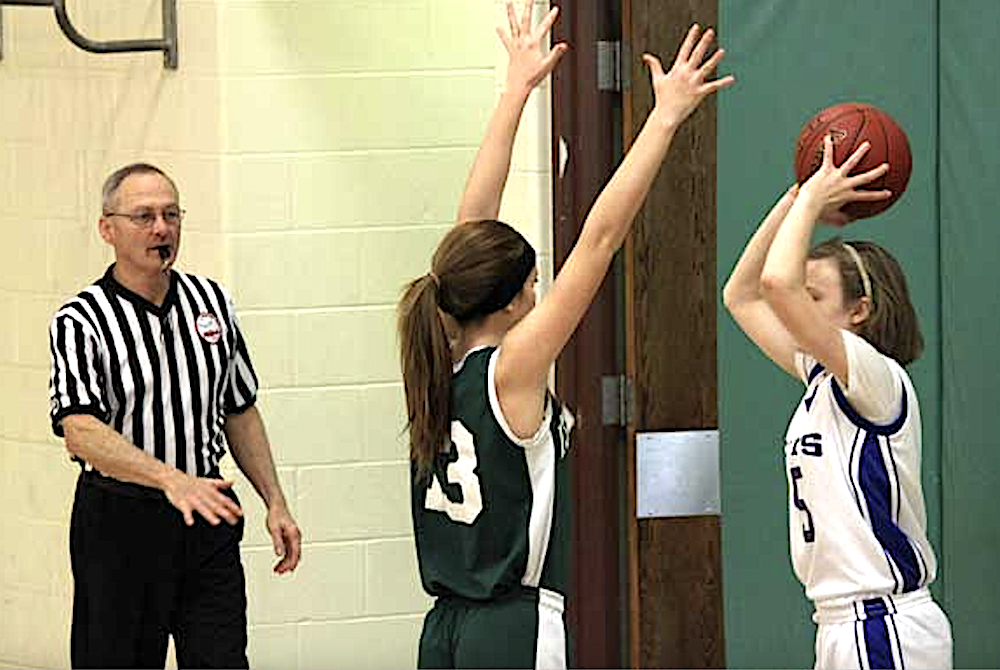
Reeb, Officiating Crew Dedicated to Helping Make Island Games Go
By
Tom Spencer
Special for MHSAA.com
January 8, 2022
High school sports officials are quite familiar with the phrase, “They can’t play the game without you.”
 Athletic Directors are even more familiar with it. They live it. They believe it. Covering the multitude of interscholastic contests is quite daunting for mainland Michigan ADs.
Athletic Directors are even more familiar with it. They live it. They believe it. Covering the multitude of interscholastic contests is quite daunting for mainland Michigan ADs.
School officials on Mackinac Island and Beaver Island have an even bigger task.
That’s where Dave Reeb comes in. He’s been officiating volleyball and basketball for as long as folks can remember.
Without Reeb, 73 years young, and his partners, the island athletes simply wouldn’t be able to play the game.
“For many years Dave has organized getting refs over to the Island for our volleyball and basketball programs,” said Kerry Smith, Beaver Island AD. “He always makes sure we have someone here.
“Especially at a time when refs are hard to find, he always comes through for us.”
Reeb would have been at Mackinac Island this weekend with Glen McIntyre to officiate a boys basketball Northern Lights Conference game between the Lakers and Munising Baptist. COVID-19 challenges caused the visitors to cancel the Friday evening and Saturday morning contests.
McIntyre is currently registered for basketball, volleyball and softball with MHSAA. He began officiating in 1979. He got into volleyball a few years ago He’s scheduled to go with Reeb to Mackinac Island again Feb. 11 and to Beaver Island Feb. 18.
In the meantime, Reeb will take advantage of the weekend off and travel to Perry with his wife, Linda, to watch one of his grandsons play middle school basketball. It should be easy traveling as compared with journeying to Mackinac and Beaver.
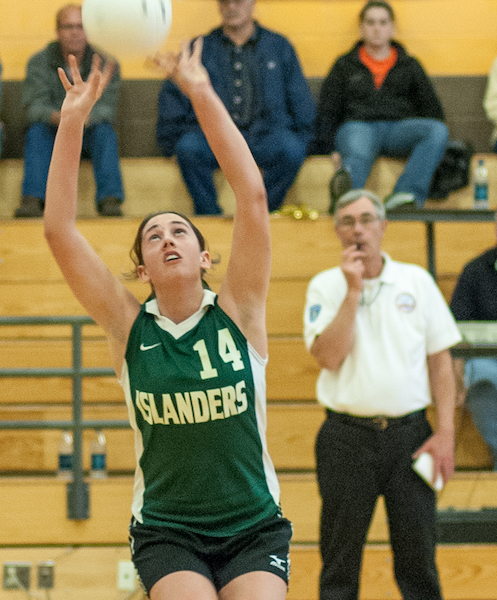 Boat, airline and sometimes snowmobiles are offered by the schools to get Reeb and his partners over from the mainland and to the school. Reeb lives in the Inland Lakes area, as do many of his partners.
Boat, airline and sometimes snowmobiles are offered by the schools to get Reeb and his partners over from the mainland and to the school. Reeb lives in the Inland Lakes area, as do many of his partners.
During his early days of going to the islands, Reeb flew out of Petoskey with his former referee partner Randy Sagante in a private plane actually piloted by Sagante. The two of them were dubbed “The Flying Referees” by a local reporter.
Chartered flights have been the most common mode Reeb and other referees have used to get to both islands.
“With Mackinac, you never know,” said Reeb, a 30-year volleyball and 20-year basketball veteran. “When you go over there on the ice crusher … it’s been fun too.”
Reeb’s next island game is at Beaver Island on Jan. 14. Steve Hines, formerly the longtime girls basketball coach at East Jordan, will be taking his first trip to officiate the Islanders with Reeb. They are scheduled to fly out of the Charlevoix Airport.
Hines has officiated volleyball with Reeb and has been to Mackinac Island once for volleyball. They’ve done basketball games together previously on the mainland.
“When I exited coaching, I decided to give officiating a shot,” Hines said. “I am looking forward to going with Dave.”
Hines is a shiny example of what school administrators love about Reeb. He always comes through with a partner so kids can play the game
“Every time, yep,” Hines said of Reeb.
Amy Peterson, who is now in her second year as superintendent, principal and athletic director for Mackinac Island, is glad she met Reeb shortly after starting on the Lake Huron island. She had been involved in athletics in her previous job at Houghton Lake but only as a parent of school athletes.
Reeb had been coming to Mackinac Island long before she arrived.
“I got to know Dave last year right when I got here,” Peterson said. “One thing about Dave is he is either here himself to help or he knows a whole lot of people who can.
“Being new to this area and the athletic part, he was really helpful.”
Another example of getting officials to the islands is Reeb’s grandson, Jacob. He went to Beaver Island in 2018 and 2019 to referee both volleyball and basketball with his grandfather.
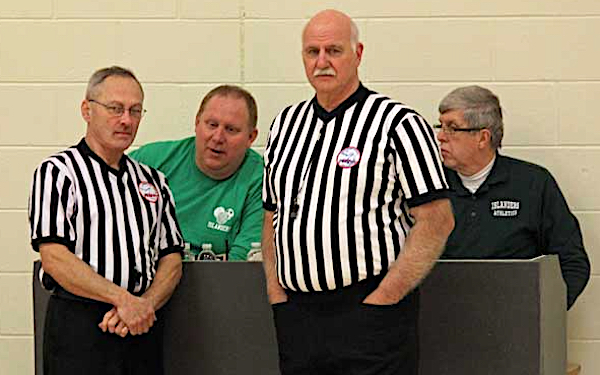 “After we’d get done, he’d stick around and shoot baskets with the teams,” Reeb said. “They got to know him.
“After we’d get done, he’d stick around and shoot baskets with the teams,” Reeb said. “They got to know him.
“It was fun for him. It was a connection for him too.”
It isn’t just his just his abilities to get officials nor his officiating skills that stand out for Reeb on the Lake Michigan island though.
“Dave is not only a ref but a friend to our community,” Smith said. “He genuinely cares about the kids and community here.
“He is an amazing asset to our school and the other schools he serves all over Northern Michigan,” Smith continued. “Dave is one of a kind, and we truly appreciate his commitment and dedication to BICS.”
Smith noted Reeb has had a significant impact on student-athletes over the years.
“The kids and parents know him well,” she said. “He goes out of his way to help kids improve skills as well as help new coaches.
“He always has a smile and a kind of easy-going demeanor,” she continued. “Everyone knows Dave, and we will keep him coming back to the island for as long as he wants to ref.”
Reeb has enjoyed the relationships, too, just as he did during his career as an educator with the Inland Lake schools.
“It is great to see the students progress year to year,” he said. “Now I am seeing some of their kids coming through, just like I did at Inland Lakes.
“Some of the fans have been enjoyable … you see them again and again,” he added. “I have really, really enjoyed it, and it helps the schools.”
Retired Beaver Island volleyball coach Connie Boyle indicated Reed was much more than a referee. She was impressed with Reeb’s commitment and saw him as a mentor, coach and a friend to many of the visiting coaches, as well as visiting and island athletes.
“When you ref on the island, it is a huge time commitment because you need to be at Island Airways in Charlevoix for your flight by 4:30 and you will ref basketball and volleyball games that night, as well as first thing in the morning, which means you won't leave the island until 1 o’clock the next day,” she said. “You can always count on Dave to do an impeccable job during the game.”
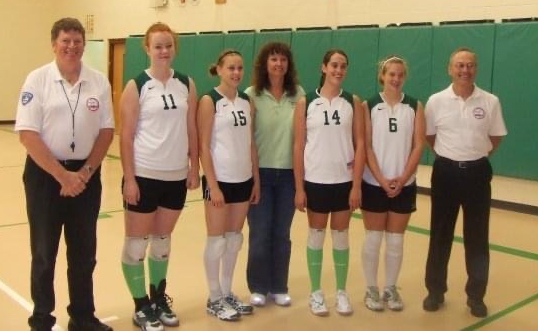 Boyle is one of many who noted the specialness and frequency of which Reeb and his wife Linda made quilts and presented them as gifts.
Boyle is one of many who noted the specialness and frequency of which Reeb and his wife Linda made quilts and presented them as gifts.
“Occasionally he gifts a senior one of his very special quilts, which are truly amazing and cherished by the girls,” Boyle said. “Because if Dave Reeb thinks you're a special player and person, you stand even a little taller.”
Boyle’ s daughter Caitlin, who died last year after battling a brain tumor, received a quilt from the Reebs. She was part of the Islanders Class of 2009.
Tom Frick, now retired, was a teacher at Mackinac Island and Inland Lake schools. He refereed volleyball and basketball for nine years. He was yet another example of Reeb finding referees to help.
“One day we were talking and he said, ‘Get your stuff, and we’ll do it’ - so I did,” Frick recalled. “We went over there four or five years.
“He was very committed to the those people on the islands,” Frick continued. “They really enjoyed him.”
Weather often interferes with getting on and off the islands. Reeb has never taken the two-hour ferry ride from Charlevoix to Beaver, counting on the plane ride. He has been on the much shorter ferry ride to Mackinac.
For the most part, the flights to the islands have been fine, the officials noted. Only once on each Island did Reeb get “stranded” while refereeing the Lakers and Islanders. He and his partner had to spend another night waiting for the weather to clear for a flight back to the mainland.
 Tom Spencer is a longtime MHSAA-registered basketball and soccer official, and former softball and baseball official, and he also has coached in the northern Lower Peninsula area. He previously has written for the Saginaw News, Bay County Sports Page and Midland Daily News. He can be reached at [email protected] with story ideas for Manistee, Wexford, Missaukee, Roscommon, Ogemaw, Iosco, Alcona, Oscoda, Crawford, Kalkaska, Grand Traverse, Benzie, Leelanau, Antrim, Otsego, Montmorency, Alpena, Presque Isle, Cheboygan, Charlevoix and Emmet counties.
Tom Spencer is a longtime MHSAA-registered basketball and soccer official, and former softball and baseball official, and he also has coached in the northern Lower Peninsula area. He previously has written for the Saginaw News, Bay County Sports Page and Midland Daily News. He can be reached at [email protected] with story ideas for Manistee, Wexford, Missaukee, Roscommon, Ogemaw, Iosco, Alcona, Oscoda, Crawford, Kalkaska, Grand Traverse, Benzie, Leelanau, Antrim, Otsego, Montmorency, Alpena, Presque Isle, Cheboygan, Charlevoix and Emmet counties.
PHOTOS (Top) Official Dave Reeb counts off an inbound during a basketball game at Beaver Island. (2) Former longtime official Morris Porter monitors the action as Caitlin Boyle sets during a 2008 match. (3) From left, Reeb, Gerald LaFreniere, referee Jerry Cook and Rick Speck talk things over at the scorer’s table. (4). From left, former official Randy Sagante with Beaver Island athletes Heather McDonough (11), Deven Cook (15), former volleyball coach Connie Boyle, Caitlin Boyle (14), Maeve Green (6) and Reeb. The four athletes were seniors in 2008-09. (Basketball photos courtesy of Beaver Island News on the ‘Net; volleyball photos courtesy of Frank Solle.)

